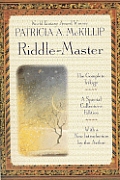
| Series: | Riddle-Master #3 |
| Publisher: | Ace |
| Copyright: | 1979 |
| Printing: | March 1999 |
| ISBN: | 0-441-00596-9 |
| Format: | Trade paperback |
| Pages: | 217 |
This is the third and concluding book in the Riddle-Master trilogy. It picks up immediately after Heir of Sea and Fire and shouldn't be read out of order. I read this book as part of the Riddle-Master: The Complete Trilogy omnibus, which is what the publication information is for.
Morgon has wandered the world and gained his power. Raederle has done something similar. Power is gathering at Lungold, war is threatening the world, and the High One is still a mystery. A war with the changelings has built in the backgorund. The first two books of this trilogy did a lot of building, introduced a lot of threads, and had little payoff, putting all of the pressure on the final book. And the trilogy to date has focused closely on character emotions and reactions, rather than maps and powers, demanding something more satisfying from the final volume than a big explosion and a lot of exposition.
Appropriately, since the first was Morgon's story and the second was Raederle's, this is theirs together. Harpist in the Wind opens with a tight focus on them and keeps that thread through the core of the story. The start is a bit slow because of it, involving more setup and then another extended journey across the countryside (although it's nice to have a sense of distance that's absent in a lot of fantasies). I started the book hungry for plot revelations and world background, so this felt tedious. But later in the book I appreciated the foundation McKillip lays for Morgon and Raederle's relationship here. They're neither childish nor perfect with each other, the arguments aren't excessively dramatic, but they still disagree, go through crises of trust, and then come back to each other. This does a lot to ground the power struggles and dramatic battles in human emotions. And despite Morgon's clear role as the destined hero, Raederle makes her own role in the conflict.
About a third of the way through, hints start to pay off and the world background and alliances become satisfyingly complex. McKillip wraps up the story with a few pure villains, but even in battles against those there's less simple good versus evil than typical. Instead, she focuses the story on choice, on decisions of how to react to evil and peril, and on the difficulties of finding the right course of action even if you've decided what's wrong. This is territory frequently left untouched in epic fantasy, and while Morgon's caution is occasionally frustrating, that frustration becomes realistic and is well-handled in the course of the story.
A quick synopsis of the heroes, basic plot, and final resolution would make this series sound like typical epic fantasy. Where it stands apart is in its portrayal of emotional reactions without either childish angst or a monofocus on power. This is a world where power works the way that it does in the real world: balances are upset, long-term grudges may be created, enemies have other enemies who will step into the void, and taking power to solve one problem creates others. People don't heal easily and the most respected characters are the ones who pay a high price and still make good decisions.
I said in the review of the previous book that the series would stand or fall on the strength of the last book, and I think McKillip pulled it out. This is easily the best book of the series, building on the emotional structure of the previous books to give the reader a multilevel climax with emotional power. There are some guns left on the mantle (Hed's unusual role mostly fizzles, alas), but I came away caring about Morgon and especially Raederle as characters and satisfied with the conclusion.
Reviewed: 2007-08-26